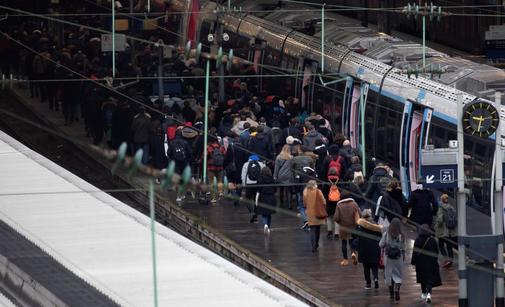- Retirement reform: the advantages of belonging to the French working elite
- Proposal: From 42 special regimes to one: this is the reform of Macron's pensions
Following the success of the strike (which continues) and the demonstrations on Thursday, the pulse between the Government and unions remains in the conflict over the retirement reform, emblem of President Emmanuel Macron's mandate. But there are also nuances .
The most important has been made by the prime minister in an address from his residence. Edouard Philippe ratified that he maintains his reform that "implies the disappearance of special regimes." But he showed his "total disposition" to "progressive transitions."
That is, to negotiate which generation is the first to retire with the new rules. Last week he discarded the "grandfather's clause", that is, it applies only to those who begin their working life. That would mean postponing it 40 years . But then and today ruled out acting "brutally." In principle, the universal point system would enter into force in 2025. But there is room for negotiation. Singularly, on the railway and public transport in Paris whose workers the prime minister was referring specifically.
Another novelty, Philippe announced that on Wednesday he will present his entire project and not just the master lines. It is clear that the thing is not to make the suspense last.
Earlier, on Monday, the Minister of Solidarity and Health, Agnès Buzyn, and the high commissioner for reform, Jean Paul Delevoye, will celebrate the last round of contacts with employers' and trade union organizations. Then, Delevoye, the veteran politician dedicated full time to talk to the social partners, will deliver his final report.
The unions, before the prime minister spoke, had already announced their plans for next week. On Tuesday, a new day of interprofessional struggle and demonstrations. Thursday's success (1.5 million according to the CGT, 806,000, according to Interior) has given them momentum.
Although the strike is only called until Monday, it is clear that it will continue in the first days of next week. Today Friday, France remained almost without trains (10% high speed) and Paris, almost without metro (10 closed lines). Same tonic can be expected during the weekend.
The effects have been sidereal. In the morning, 300 kilometers of traffic jams in and around Paris. At the time of sending this chronicle (18:15), 580 km, according to the Sytadin website, the meter used by all French media. On Thursday, on the contrary, there was less traffic than on a working day. Yesterday, chaos.
On the union side, there are also nuances. Teachers and teachers barely missed work today Friday when the previous day went on strike half of the workforce. The Prime Minister addressed them yesterday: "The progressive revaluation of his salary will make his pension not decrease." Separating this collective, numerous and very syndicated, from the hard core of the strike is essential for the Government. On the other side, we try to add them in the fight days.
Another interesting detail is that the cadre of cadres has not joined the call for demonstrations on Tuesday. They continue to support the strike but prefer to wait to see the government project to decide. It should be remembered that the most moderate and most voted union in the union elections (CFDT) does not support the strike, although its railroad section does.
It is also significant that the unions have unmarked themselves from the call for yellow vests. These are manifested on Saturday in Paris on the first anniversary of his most secondary and violent days. A specialist in security matters predicted in Le Parisien: "This is burning, there will be rock and roll." The unions know that their militants are mobilized and do not need or want to be involved in anger.
According to the criteria of The Trust Project
Know more- Paris
- France
Such a day as today ... 11/14/1994 The discreet Eurostar birthday
France Evict about 300 migrants arriving from the 'jungle' of Calais from a Paris camp
FranceThe strike that paralyzes France, in 7 questions

